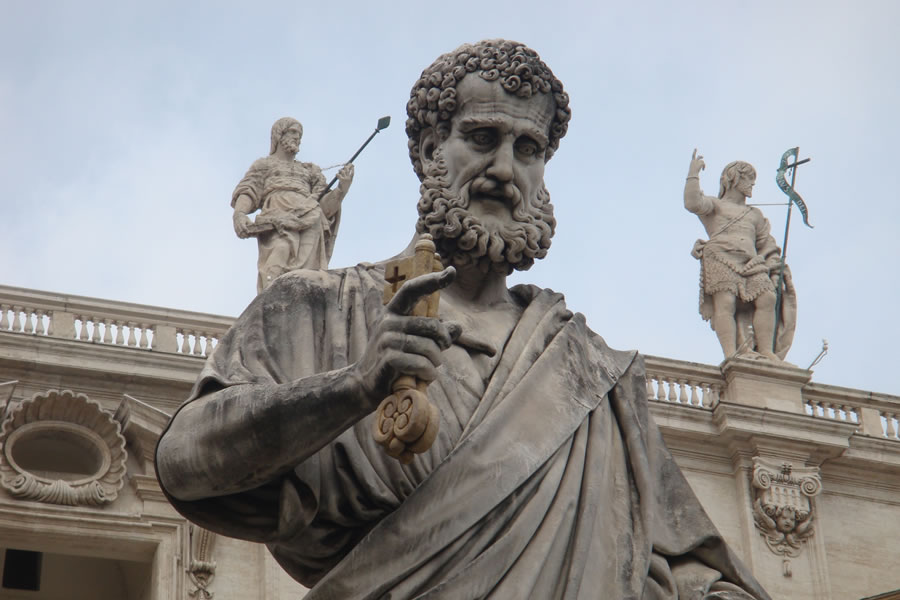
21st Sunday of Ordinary Time
08-27-2017Weekly Reflection©2017 Liturgical Publications, Inc."And so I say to you, you are Peter, and upon this rock I will build my church." Simon got a new name after his profession of faith. As soon as he declared to Jesus, "You are the Christ, the Son of the living God," Jesus renamed him with a title that means "rock." And with that name he gave Peter the mission to be a solid foundation upon which he would build his church. Not Peter's church. Not James or Paul's church. Not Martin Luther's or John Calvin's or anybody else's. This is Jesus' church, the church of Christ himself, that we call the Catholic Church.
So it was Christ himself who desired to give authority in the church--"the keys to the kingdom of heaven"--to a human leader. Peter was thus established as the first pope. He exercised a special kind of headship, within the community of the apostles and the church at large, because Jesus gave him the power to do so, not because Peter claimed it for himself. And so too every pope since, right down to our Holy Father today, exercises this unique leadership within the Church.
What a gift this is to us! Jesus knew well the human tendency to squabble and disagree, to argue and compete. He knew that the church would be prone to all of this because of her members, and that providing a final voice of authority, saying in effect that "the buck stops here" would be helpful for maintaining unity. As Catholics, even in spite of the differing opinions and perspectives that are manifest in the Church, we nonetheless maintain a strong sense of identity and belief thanks in large part to the papacy. Today, may we give thanks for the pope and pray for him as he strives to lead all of us closer and closer to Christ.
Cuando no hacemos bien las cosas en el ministerio o trabajo, se nos quita de repente las responsabilidades a las que hemos sido llamadas y se le confieren a otra persona. Esto sucede cuando solamente nos preocupamos egoístamente de nuestros propios intereses. Eso ha pasado en la primera lectura de hoy. Hay cambio de liderazgo; el profetaanuncia que Sebná será sustituido de su cargo por el hijo de Elcías. Eleacín es la persona destinada para trabajar por el bien común. "Pondré la llave del palacio de David sobre su hombro. Lo que él abra, nadie lo cerrará; lo que él cierre, nadie lo abrirá " (Is 22, 22).
La similitud, en el Evangelio, existe cuando Jesús escoge a Pedro quien será el líder de su Iglesia. "Y yo te digo a ti que tú eres Pedro y sobre esta piedra edificaré mi Iglesia. Los poderes del infierno no prevalecerán sobre ella. Yo te daré las llaves del Reino de los cielos; todo lo que ates en la tierra quedará atado en el cielo, y todo lo que desates en la tierra quedará desatado en el cielo" (Mt 16, 18-19). Estos pasajes de la Sagrada Escritura tienen profunda enseñanza y advertencia para la comunidad de discípulos que ejercen su ministerio en las parroquias. Poner la llave del palacio de David en Eleacín y las llaves del Reino de los cielos en las manos de Pedro, significa confianza de Dios hacia sus ministros. Por lo tanto, la respuesta debe ser fidelidad hacia Dios para servir a su Iglesia, con la pregunta de Jesús siempre en la mente y corazón. "Y ustedes, ¿quién dicen que soy yo?" (Mt 16, 15). Para usted ¿quién es Cristo? Es vital la respuesta para cada persona que se dice seguidor de Jesús.
BACK TO LIST